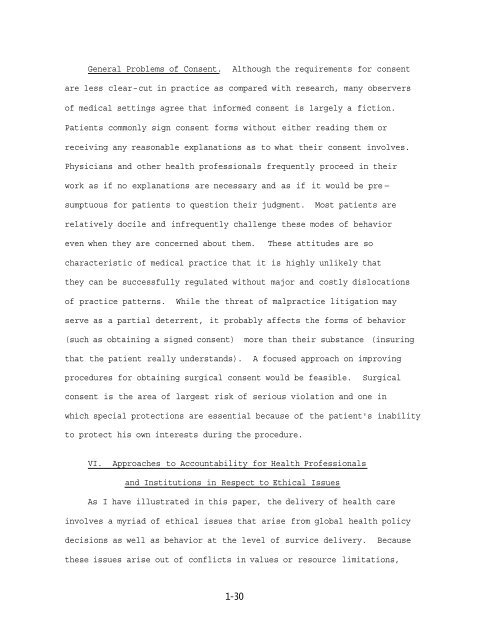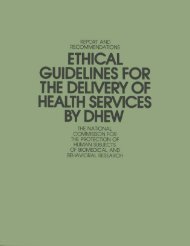- Page 3: APPENDlX TO ETHICAL GUIDELINES FOR
- Page 6 and 7: C O N T E N T S (CONTINUED) III. MA
- Page 9: 1 ETHICAL PROBLEMS IN THE DELIVERY
- Page 12 and 13: Summary of Major Recommendations 1.
- Page 14 and 15: I. The Charge This report examines
- Page 16 and 17: specific rules and affirmations of
- Page 18 and 19: III. Ethical Principles in Service
- Page 20 and 21: organizational procedures, types of
- Page 22 and 23: physicians to control or sanction o
- Page 24 and 25: categorization and is neither frivo
- Page 26 and 27: Finally, it has been observed that
- Page 28 and 29: substantially by the mode of remune
- Page 30 and 31: the economic incentives for expensi
- Page 32 and 33: well because such facilities are ge
- Page 34 and 35: in the patient's care, clear guidel
- Page 36 and 37: V. Problems in Service Delivery Rel
- Page 38 and 39: examination or request; and that th
- Page 42 and 43: occurs. Moreover, litigation is a h
- Page 44 and 45: In implementing a grievance procedu
- Page 46 and 47: difficulty in evaluating their feel
- Page 48 and 49: suggested in this paper. However, I
- Page 50 and 51: 9. David Sudnow, Passing On: The So
- Page 53: 2 ON THE RELEVANCE OF ETHICAL PRINC
- Page 56 and 57: lines even if the Commission determ
- Page 58 and 59: activity was research and, as such,
- Page 60 and 61: concerned--including the Obstetrics
- Page 62 and 63: 4) Sterilization of the Relf Sister
- Page 64 and 65: esearch. In the next section we sha
- Page 66 and 67: expectation of success." Thus, it d
- Page 68 and 69: Yet, something of an analogy may be
- Page 70 and 71: eview proposed activities classifie
- Page 72 and 73: Thus, the standards for the negotia
- Page 74 and 75: "The basis of plans currently opera
- Page 76 and 77: e incomplete. Therefore, I suggest
- Page 78 and 79: equirements. I suggest that the sam
- Page 80 and 81: discussed; ie the NIH requirement f
- Page 82 and 83: perience with drugs where the class
- Page 84 and 85: available for these functions seem
- Page 86 and 87: "...the customary standard for rout
- Page 88 and 89: Some activities conducted in the ca
- Page 90 and 91:
15. Report of the International Con
- Page 93 and 94:
REPORT TO THE COMMISSION FOR THE PR
- Page 95 and 96:
organization were considered, metho
- Page 97 and 98:
consulted on specific questions reg
- Page 99 and 100:
Section I Research Guidelines The N
- Page 101 and 102:
Section IT DHEW Health Programs In
- Page 103 and 104:
2. “Capacity building" (8) progra
- Page 105 and 106:
Section III Criteria for Applicatio
- Page 107 and 108:
The guideline relating to "investig
- Page 109 and 110:
address problems germane to the del
- Page 111 and 112:
The goal of research is to limit th
- Page 113 and 114:
Although health practitioners are p
- Page 115 and 116:
Governmental authority, however, is
- Page 117 and 118:
Question Number 4: Do the language
- Page 119 and 120:
Section V Points for Consideration
- Page 121 and 122:
It is also important to note that s
- Page 123:
Footnotes 1. Public Law 93-348. 2.
- Page 127 and 128:
The Relevance of Ethical Principles
- Page 129 and 130:
the conclusion follows that there i
- Page 131 and 132:
There are two types of moral proble
- Page 133 and 134:
E. The Right of Equal Access to Hea
- Page 135 and 136:
III. THE FUNCTIONS OF ETHICAL PRINC
- Page 137 and 138:
the discussion will return to the c
- Page 139 and 140:
of patients and physicians. Measuri
- Page 141 and 142:
health service programs ought not d
- Page 143 and 144:
for choice, without an overriding m
- Page 145 and 146:
elevant similarities and difference
- Page 147 and 148:
Suppose Congress had asked the ethi
- Page 149 and 150:
To return to an unfinished theme of
- Page 151 and 152:
to explain political obligations on
- Page 153 and 154:
a social-ethical contract that prov
- Page 155 and 156:
References 1. Toulmin, S.: Reason i
- Page 157:
22. Aiken, op. cit., p. 162. 23. Go
- Page 161 and 162:
ETHICAL ISSUES IN HEALTH CARE Roy B
- Page 163 and 164:
Others who have argued that ethical
- Page 165 and 166:
Robert Nozick is the leading advoca
- Page 167 and 168:
justice is to overcome the results
- Page 169 and 170:
a higher level of health care than
- Page 171 and 172:
not increase social inequality. The
- Page 173 and 174:
(Family Health Centers) and critica
- Page 175 and 176:
the fact that in general humans are
- Page 177 and 178:
technique to which society would no
- Page 179 and 180:
consistent distinction made between
- Page 181:
National Commission for the Protect
- Page 185:
6 ETHICS IN HUMAN EXPERIMENTATION I
- Page 188 and 189:
out that in the treatment of the pa
- Page 190 and 191:
With regard to special study the Co
- Page 192 and 193:
that the study population was not i
- Page 194 and 195:
TABLE 1 Gray's study: Awareness of
- Page 196 and 197:
In addition to the racial or ethnic
- Page 198 and 199:
which were carried out among the Pu
- Page 200 and 201:
In a direct comparison between whit
- Page 202 and 203:
standards for assuring the protecti
- Page 204 and 205:
"Black Doctors Launch Probe of Syph
- Page 207:
7 AMERICAN INDIAN HEALTH CARE DELIV
- Page 210 and 211:
absorbed into the system. Contrary
- Page 212 and 213:
But exactly the opposite is true. T
- Page 214 and 215:
American Indian medical students ha
- Page 216 and 217:
1. Public Forum before the Committe
- Page 219 and 220:
"IT IS UNFORGIVEABLE THAT IN A COUN
- Page 221 and 222:
WRITTEN OR RECORDED INFORMATION, WH
- Page 223 and 224:
THESE WRITTEN GUIDELINES AND PROCED
- Page 225 and 226:
ISTICS AMONG THIS POPULATION GROUP
- Page 227 and 228:
SPANISH SPEAKING PEOPLE LIVE IN DIS
- Page 229 and 230:
3-11
- Page 231 and 232:
ALTHOUGH LIMITED, DEMOGRAPHIC SOCIA
- Page 233 and 234:
THESE ARE VIEWS OF LIFE THAT PEOPLE
- Page 235 and 236:
FOLK MEDICINE IS STILL WIDELY PRACT
- Page 237 and 238:
WITHOUT SUCH SAFEGUARDS IT IS NOT U
- Page 239 and 240:
8-21
- Page 241:
BIBLIOGRAPHY Aalysis of DHEW Health
- Page 245:
6 ETHICS IN HUMAN EXPERIMENTATION I
- Page 248 and 249:
out that in the treatment of the pa
- Page 250 and 251:
With regard to special study the Co
- Page 252 and 253:
that the study population was not i
- Page 254 and 255:
TABLE 1 Gray's study: Awareness of
- Page 256 and 257:
In addition to the racial or ethnic
- Page 258 and 259:
which were carried out among the Pu
- Page 260 and 261:
In a direct comparison between whit
- Page 262 and 263:
standards for assuring the protecti
- Page 264 and 265:
"Black Doctors Launch Probe of Syph
- Page 267:
7 AMERICAN INDIAN HEALTH CARE DELIV
- Page 270 and 271:
absorbed into the system. Contrary
- Page 272 and 273:
But exactly the opposite is true. T
- Page 274 and 275:
American Indian medical students ha
- Page 276 and 277:
1. Public Forum before the Committe
- Page 279 and 280:
"IT IS UNFORGIVEABLE THAT IN A COUN
- Page 281 and 282:
WRITTEN OR RECORDED INFORMATION, WH
- Page 283 and 284:
THESE WRITTEN GUIDELINES AND PROCED
- Page 285 and 286:
ISTICS AMONG THIS POPULATION GROUP
- Page 287 and 288:
SPANISH SPEAKING PEOPLE LIVE IN DIS
- Page 289 and 290:
3-11
- Page 291 and 292:
ALTHOUGH LIMITED, DEMOGRAPHIC SOCIA
- Page 293 and 294:
THESE ARE VIEWS OF LIFE THAT PEOPLE
- Page 295 and 296:
FOLK MEDICINE IS STILL WIDELY PRACT
- Page 297 and 298:
WITHOUT SUCH SAFEGUARDS IT IS NOT U
- Page 299 and 300:
8-21
- Page 301:
BIBLIOGRAPHY Aalysis of DHEW Health
- Page 305 and 306:
Resolution and Recommendations of t
- Page 307:
Where patients are treated in teach
- Page 311:
10 AMERICAN HOSPITAL ASSOCIATION ST
- Page 314:
(11) The patient has the right to e
- Page 318 and 319:
HEALTH SERVICES ADMINISTRATION Admi
- Page 320:
12 PATIENT'S BILL OF RIGHTS PHOENIX
- Page 323 and 324:
2-1.2 12-14-73 may not be able to p
- Page 325 and 326:
2-1.2 12-14-73 10. The patient has
- Page 328 and 329:
CONDITIONS OF PARTICIPATION MEDICAR
- Page 330:
(12) May meet with, and participate
- Page 333:
14 DEPARTMENT OF HEALTH, EDUCATION,
- Page 336 and 337:
and private resources available for
- Page 339 and 340:
15-1
- Page 341 and 342:
PERSONAL PRIVACY IN AN INFORMATION
- Page 343 and 344:
PERSONAL PRIVACY IN AN INFORMATION
- Page 345 and 346:
PERSONAL PRIVACY IN AN INFORMATION
- Page 347 and 348:
PERSONAL PRIVACY IN AN INFORMATION
- Page 349 and 350:
PERSONAL PRIVACY IN AN INFORMATlON
- Page 351 and 352:
PERSONAL PRIVACY IN AN INFORMATION
- Page 353 and 354:
PERSONAL PRIVACY IN AN INFORMATION
- Page 355 and 356:
PERSONAL PRIVACY IN AN INFORMATION
- Page 357 and 358:
PERSONAL PRlVACY IN AN INFORMATION
- Page 359 and 360:
PERSONAL PRIVACY IN AN INFORMATION
- Page 361 and 362:
PERSONAL PRIVACY IN AN INFORMATION
- Page 363 and 364:
PERSONAL PRIVACY IN AN INFORMATlON
- Page 365 and 366:
PERSONAL PRIVACY IN AN INFORMATION
- Page 367 and 368:
PERSONAL PRIVACY IN AN INFORMATION
- Page 369 and 370:
PERSONAL PRIVACY IN AN INFORMATION
- Page 371 and 372:
PERSONAL PRIVACY IN AN INFORMATION
- Page 373 and 374:
PERSONAL PRIVACY IN AN INFORMATION
- Page 375 and 376:
PERSONAL PRIVACY IN AN INFORMATION
- Page 377 and 378:
PERSONAL PRIVACY IN AN INFORMATION
- Page 379 and 380:
PERSONAL PRIVACY IN AN INFORMATION
- Page 381 and 382:
PERSONAL PRIVACY IN AN INFORMATION
- Page 383 and 384:
Fairness PATIENT ACCESS TO MEDICAL
- Page 385 and 386:
Record Keeping in the Medical-Care
- Page 387 and 388:
Record Keeping in the Medical-Care
- Page 389 and 390:
Record Keeping in the Medical-Care
- Page 391:
Record Keeping in the Medical-Care
- Page 395:
16 DEPARTMENT OF HEALTH, EDUCATION,
- Page 398 and 399:
PROPOSED RULES [ 4110-35 ] der seve
- Page 400 and 401:
2. SECTION-BY-SECTION ANALYSIS Each
- Page 402 and 403:
would allow the attending physican
- Page 404 and 405:
or widespread compelling need, and
- Page 406 and 407:
PROPOSED RULES either proposed vers
- Page 408 and 409:
PROPOSED RULES priate State agency,
- Page 410 and 411:
ments of receipt of hysterectomy in
- Page 412 and 413:
PROPOSED RULES To the best of my kn
- Page 415 and 416:
Comment of the National Commission
- Page 417 and 418:
limitation on access to sterilizati
- Page 419 and 420:
21 or unable to give informed conse
- Page 421 and 422:
form, as drafted, constitutes not o
- Page 423 and 424:
many reported deficiencies, such as
- Page 425 and 426:
Under the second alternative, a men
- Page 427 and 428:
hand, sterilization in anticipation











